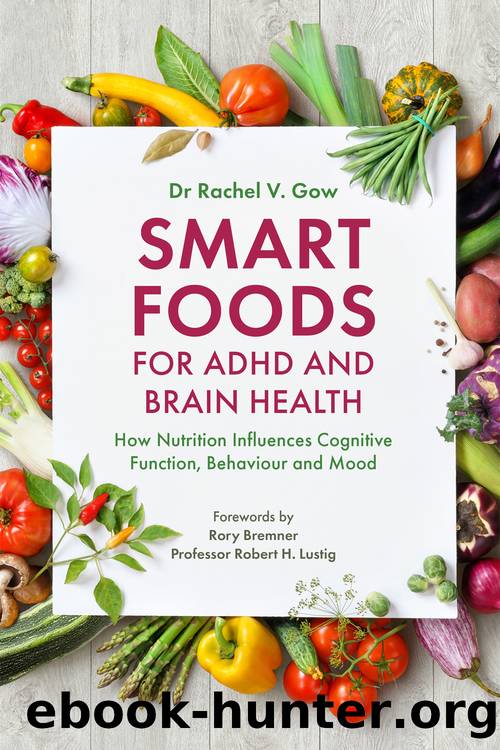Smart Foods for ADHD and Brain Health by Rachel Gow

Author:Rachel Gow
Language: eng
Format: epub
Publisher: Jessica Kingsley Publishers
Published: 2021-02-18T00:00:00+00:00
Gregoryâs Story
Sometimes nutrition is supplemental to medication or just something parents prefer over prescriptions, but even medication doesnât always work. When one intervention doesnât work, you shouldnât give up. Iâd like to share with you another clientâs story where prescriptions could not be used. Gregoryâs parents contacted me with concerns about their teenage son, Gregory, who had been suffering with inattentive symptoms related to ADD, and some oppositional behaviours at home. His mother explained that Gregory struggled to concentrate (during school, and homework in particular) and was frequently absent-minded and unable to self-motivate. Gregoryâs parents were primarily interested in a nutritional evaluation as they had previously tried medication but had been forced to discontinue due to its side effects.
My first impressions of Gregory were that he was an extremely polite and well-mannered young man, smart and articulate. He told me that he struggled to pay attention, especially at school, and at home spent a fair amount of time gaming and browsing the internet. A detailed assessment of his medical history revealed Gregory had taken antibiotics frequently as a child, and he self-reported mood swings and bouts of anger and irritability. To our surprise, Gregoryâs lab results revealed a whopping 38 food intolerances, and seven nutritional insufficiencies in iron, alpha-carotene, zinc, vitamin B2, magnesium and vitamin D, the largest number to date in my observations.
Insufficient levels of magnesium have been observed in children diagnosed with ADHD (Moshfegh et al. 2009). Magnesium is required for healthy neurotransmitter function as well as for increasing the production of serotonin receptors (5-HT1A) and helping the calming action of GABA (gamma-aminobutyric acid) (Black et al. 2015). Modern processed foods including fizzy drinks (soda), caffeine and white refined sugar can deplete magnesium levels in the body, and insufficient levels can lead to symptoms of irritability, difficulty with concentration, insomnia, depression and anxiety. A small research study which supplemented children with ADHD aged 6â16 with magnesium resulted in a significant improvement in core behavioural symptoms of inattention, impulsivity and hyperactive behaviours, as well as cognitive function (El Baza et al. 2016). Other studies have also reported improvements in ADHD symptoms following supplementation with magnesium (Kozielec and Starobrat-Hermelin 1997; Nogovitsina and Levitina 2007). Vitamin B6 also works synergistically to increase magnesium absorption (Mousain-Bosc et al. 2004, 2006). Magnesium-rich foods include avocados, bananas, beans and green leafy vegetables.
To increase Gregoryâs energy levels, I suggested he avoided the processed breakfast cereals he had been eating as these have a high glycaemic load (GL) that result in fluctuations in blood sugar levels (i.e. spikes and dips), with consequences for mood, concentration and attention. I recommended that they tried switching to porridge oats (oatmeal) with a little honey, cinnamon or pureed fruit to flavour, or consider instead preparing a high-protein and omega-3-rich breakfast meal such as vegan (dairy-free) egg whites with an oily fish such as smoked salmon, mackerel, or a vegan omelette with his favourite vegetable fillings.
Due to Gregoryâs high number of food intolerances, I suggested some nutritional changes to improve his gut microbiome, such as increasing his intake of prebiotic foods (e.
Download
This site does not store any files on its server. We only index and link to content provided by other sites. Please contact the content providers to delete copyright contents if any and email us, we'll remove relevant links or contents immediately.
I Capture the Castle by Dodie Smith(1571)
Aspergirls by Rudy Simone(1361)
Be Different by John Elder Robison(1330)
Autism's False Prophets by Paul A. Offit(1238)
My Child's Different by Elaine Halligan(1228)
Smart but Scattered—and Stalled by Richard Guare(1193)
What's Making Our Children Sick? by Michelle Perro(1155)
101 Tips for the Parents of Boys with Autism by Ken Siri(1151)
Asperger Syndrome (Autism Spectrum Disorder) and Long-Term Relationships by Ashley Stanford(1112)
ADHD by Mark Selikowitz(1105)
An Adult with an Autism Diagnosis by Gillan Drew(1070)
Girlish by Lara Lillibridge(1067)
Nerdy, Shy, and Socially Inappropriate by Cynthia Kim(1053)
Animal-assisted Interventions for Individuals with Autism by Temple Grandin(1035)
On Immunity: An Inoculation by Biss Eula(1026)
Seeing Ezra by Kerry Cohen(1004)
Overcoming ADHD by Stanley I. Greenspan & Jacob (con) Greenspan(990)
Why Gender Matters by Leonard Sax M.D. Ph.D(981)
Sarah's Child (Hqn Romance) by Linda Howard(977)
